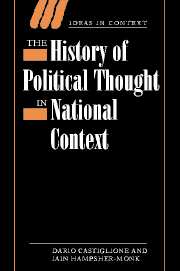Book contents
- Frontmatter
- Contents
- List of contributors
- Preface
- 1 Introduction The history of political thought and the national discourses of politics
- 2 The voice of the ‘Greeks’ in the conversation of mankind
- 3 History of political theory in the Federal Republic of Germany: strange death and slow recovery
- 4 A German version of the ‘linguistic turn’: Reinhart Koselleck and the history of political and social concepts (Begriffsgeschichte)
- 5 One hundred years of the history of political thought in Italy
- 6 Discordant voices: American histories of political thought
- 7 The professoriate of political thought in England since 1914: a tale of three chairs
- 8 The history of political thought and the political history of thought
- 9 The rise of, challenge to and prospects for a Collingwoodian approach to the history of political thought
- 10 Towards a philosophical history of the political
- 11 ‘Le retour des émigrés’? The study of the history of political ideas in contemporary France
- 12 National political cultures and regime changes in Eastern and Central Europe
- 13 The limits of the national paradigm in the study of political thought: the case of Karl Popper and Central European cosmopolitanism
- 14 Postscript. Disciplines, canons and publics: the history of ‘the history of political thought’ in comparative perspective
- Index
- IDEAS IN CONTEXT
14 - Postscript. Disciplines, canons and publics: the history of ‘the history of political thought’ in comparative perspective
Published online by Cambridge University Press: 23 September 2009
- Frontmatter
- Contents
- List of contributors
- Preface
- 1 Introduction The history of political thought and the national discourses of politics
- 2 The voice of the ‘Greeks’ in the conversation of mankind
- 3 History of political theory in the Federal Republic of Germany: strange death and slow recovery
- 4 A German version of the ‘linguistic turn’: Reinhart Koselleck and the history of political and social concepts (Begriffsgeschichte)
- 5 One hundred years of the history of political thought in Italy
- 6 Discordant voices: American histories of political thought
- 7 The professoriate of political thought in England since 1914: a tale of three chairs
- 8 The history of political thought and the political history of thought
- 9 The rise of, challenge to and prospects for a Collingwoodian approach to the history of political thought
- 10 Towards a philosophical history of the political
- 11 ‘Le retour des émigrés’? The study of the history of political ideas in contemporary France
- 12 National political cultures and regime changes in Eastern and Central Europe
- 13 The limits of the national paradigm in the study of political thought: the case of Karl Popper and Central European cosmopolitanism
- 14 Postscript. Disciplines, canons and publics: the history of ‘the history of political thought’ in comparative perspective
- Index
- IDEAS IN CONTEXT
Summary
It is always desirable that a part of the education of those persons who are either born into, or qualified by their abilities to enter, the superior political grades of society, should be instruction in history, and that a part of the study of history should be the history of political theory.
(T.S. Eliot, Notes Towards the Definition of Culture (London, 1948), p. 88)As a social critic, T.S. Eliot could scarcely be accused of an excess of relativism. Here, his assertion of what is ‘always desirable’ is, of course, part of his coolly mandarin tone, and that tone is the natural vehicle for the assumption that there is a class, largely selected by birth, destined to control the political affairs of a country, an assumption clearly intended as a calculated provocation in the Britain of the 1945 Labour government. The passage is, in these respects, characteristic of the later Eliot's persistent attempt, in the face of disagreeable social change, to appear to be taking the assumptions of the day before yesterday for granted. But as the sequence ‘education’, ‘instruction’ and ‘study’ suggests, one assumption which Eliot could indeed take for granted was that, in referring to ‘the history of political theory’, he was referring to something that was by this date an acknowledged part of an established academic practice. It was, as we shall see, part of his conservatism to presume that the larger academic practice in question was ‘the study of history’, yet even in this detail the passage offers a usefully concise, if somewhat oblique, indication of the themes of this ‘Postscript’.
- Type
- Chapter
- Information
- The History of Political Thought in National Context , pp. 280 - 302Publisher: Cambridge University PressPrint publication year: 2001
- 16
- Cited by

